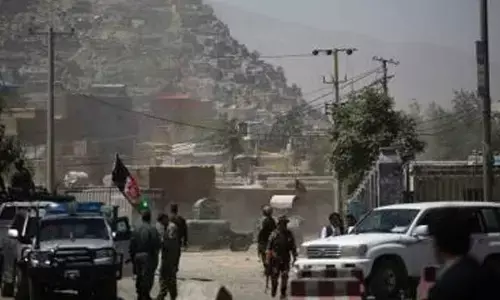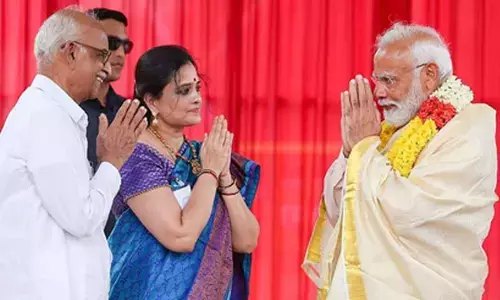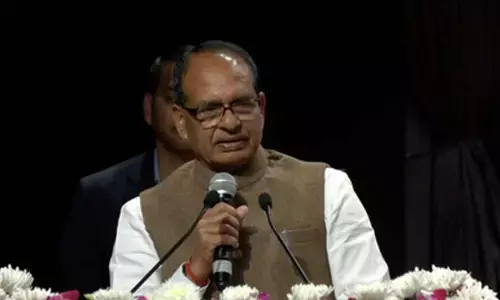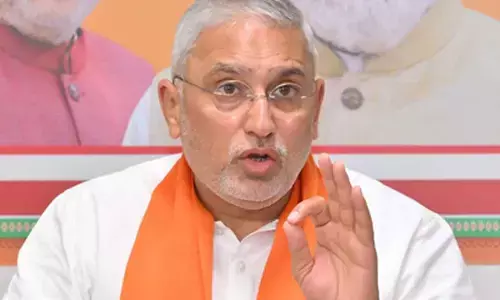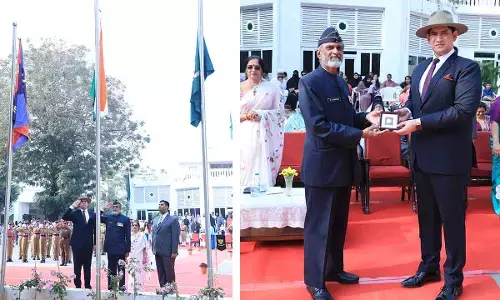A unique blend of emotion & intuition
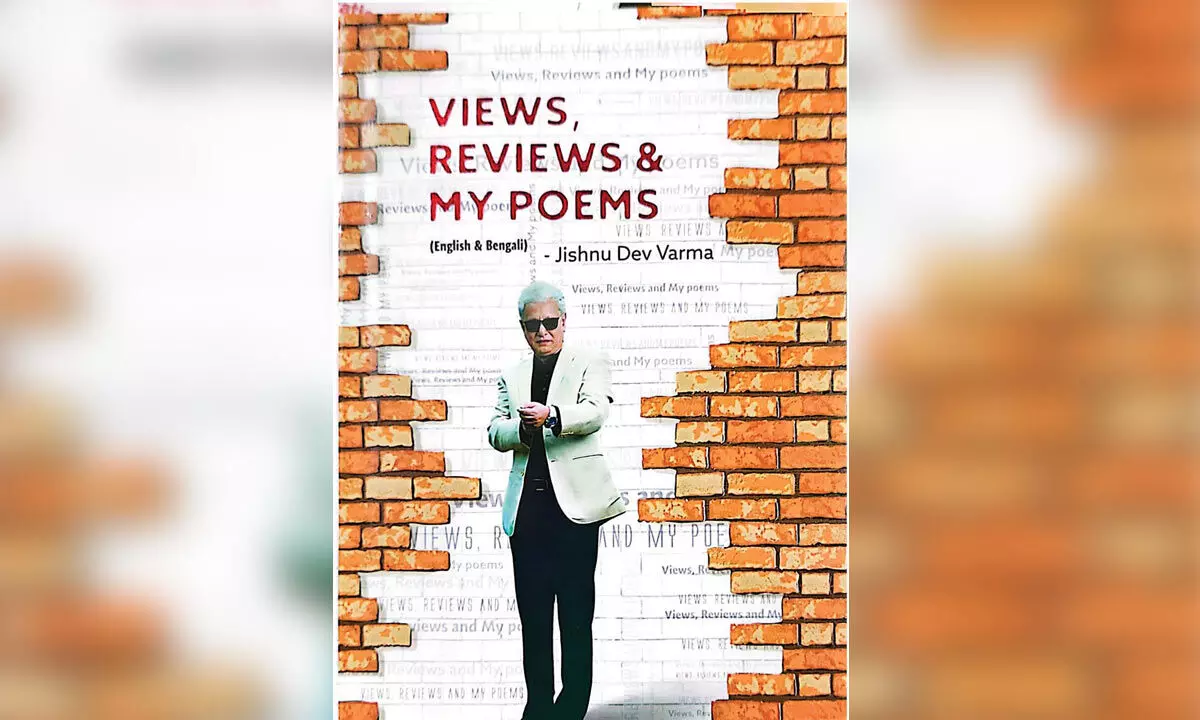
Literary appreciation of Telangana Governor Jishnu Dev Varma's poetry
A wonderful amalgamation of lyrical beauty and emotional profundity, the poetry of Jishnu Dev Varma presents a natural world that meets human experience. The rhythmic, metaphorical verses of his collection “VIEWS, REVIEWS & MY POEMS” compel deep contemplation. Despite being a descendant of royal lineage, Jishnu Dev Varma’s poetry bears an air of simplicity and humility resonating with the voice of a common man. He is, indeed, a real Renaissance man: an accomplished poet, orator, musician, and painter who merges tradition and modernity by virtue of his philosophical insight and creative depth. His works, written in Bengali, and English include prose and poetry. Fluent in Bengali, and English, his work spans prose and verse, pioneering free verse with a unique blend of emotion and intuition.
In agreement with Wordsworth's view of poetry as the spontaneous overflow of powerful feelings, works like “A Silent Song”, which deals with themes of solitude and introversion, bring Varma's sensitivity into focus. They also satisfy T S Eliot's idea of the direct communication of intuitive feeling, manifested in ”Ode to Love”, which draws upon natural metaphor to express an emotion common to all times. With rich imagery and multi-layered meanings, his poetry resides deep in the reader's heart, merging emotion with intuition.
Key Features of Varma's Poetic Style
Vibrant Imagery: The lush landscape of Varma's poetry has a rare ability to bring any scene he wishes to life, for the most part with references to nature—oceans, flowers, storms and colours—as analogies in the portrayal of human emotions. In Dance in the Springtime: "If the ocean can dance fearlessly / To the music of the storm If flowers can show off their brilliant hues, / With just one kiss-from the distant sun above."
With these lines, he draws symbolism for resilience and joy, asking the reader to face life’s challenges and find beauty in it. Repetitions and refrains: Repetition in Varma's poetry brings emphasis on themes of courage, love, and time. In Let's Not Talk, silence becomes a deep-seated bond: "Let's not talk – / For we have said enough, / Through the words that say too much. Then why bother? / When through silence / We can speak to each other.” This creates the essence of the unspoken understanding running between souls.
The repetition in The Beautiful Face of My Motherland binds the speaker to his homeland: "I look once, / I look again, / And I keep looking / At my motherland's beautiful face." The refrain mirrors the cyclical bond between the poet and his roots, where admiration transcends time and enters into a spiritual relationship.
Personification: Varma often personifies natural phenomena to harmonize the emotional moods with the physical world. In My Loneliness and Me, loneliness acts as both shield and companion: "But my loneliness / Shields me from that noisy crowd." "Blown off by life’s storms and tsunamis, /All that is left, / Is my loneliness and me." These lines reveal the dual nature of solitude – comforting yet isolating while reflecting a profound acceptance of it.
Somewhere and somehow sees natural objects embody longing and communion: "Maybe I should come as a lonely cloud, / Sailing happily in the endless blue sky." "Or maybe as a bird, / That has lost its way in the haze, / Swoop down upon your gaze." With personification, Varma interweaves human emotion and existence into Mother Nature and presents an intense image of presence and longing.
Introspection and Reflection: Varma's introspective style, blending poetry and meditation, delves into deeper meanings through emotions and experiences, as seen in Ode to Love, where he reflects on love's transformative power:
"Allow me to soak it all, / In your loving grace, / To remove those ugly stains / Time and life have made." "Come, stand by my side, / Right or wrong. / Then I won't care, / Will just hold your hand / And will follow your way." These lines talk about longings for transcendence and communion, emphasising the uplifting and transformative power of love.
The first condition of separation helps the speaker subsequently reflect upon reunion in I'll Be Back For You: "This parting is nothing, / But a new meeting." “In silence, / I’ll come back, / For all I want/ Is to be a part of all of you.”
Love expressed in yearning and everlasting attachment; the poem encapsulates it all.
Symbolism and Metaphors: There is much depth in Varma' symbolism and metaphors with which he deals with such themes as resilience and self-discovery. A Silent Song speaks of "scorching heat" as the trials of earthly life while rain stands for purification: "Let the rain pour down mercilessly, / To bathe my mind."
In Let's Look for a Place, patience evolves from virtue to vice, while the "place" symbolises an inner sanctuary: "This place is to be found nowhere / On this earth / But it’s somewhere in you / In some nook or corner." Thus, arise metaphors that lead one toward self-realisation and inner peace.
Conversational Tone: Varma's gentle and intimate conversational tone engages the reader in an immediate dialogue. Somewhere and somehow has: "When I am gone and not around, / Let's meet just once again, / Somewhere and somehow." "Maybe I should come as a lovely cloud / Sailing happily in the endless blue sky."
This tone has created an ambiance inviting readers to ponder life’s mysteries.
In My Loneliness and Me, the poem unfolds like a confidential monologue: "I sometimes look around, / Not believing what I found." "My loneliness then whispers to me: / 'Keep moving! as I narrate your story, / Of you and me.'"
The conversational setting thus bridges a deep bond between poet and reader.
Universal Themes: Varma's poetry has themes that include love, longing, belonging, and time, thus offering a cross-cultural relationship with his work. Somewhere and somehow describes the tussle between faith and action: “Let's not leave it all to destiny, / For that may never be.”
In I'll Be Back for You, he reassures: “This parting is nothing, / But a new meeting.”
In My Motherland's Beautiful Face, he thinks about identity and belonging: “I have travelled far and wide, / And from place to place, / I have been. / But now— / I look once, / I look again.”
In A Medley, he craves interaction: “If the sun, the wind, the rain, / And the rainbow, / All unreachable can reach out to you, / Why can't I?”
Universal cravings of presence and intimacy resonate in these lines.
Conclusion
Jishnu Dev Varma's poems are a deep reflection of the human experiences set in vivid images and contemplation with a lyrical format. Bright imagery and repetition, personification with a conversational tone, cajole the readers to contemplate their lives and emotions, creating a bond with nature and the complexities of existence. His reach transcends space and time, offering timeless reflections on love, longing, and belonging, thus captivating the readers.
(Writer is Joint Secretary to the Governor, Telangana; Views expressed are purely personal)








